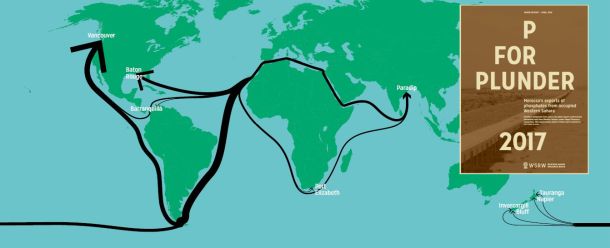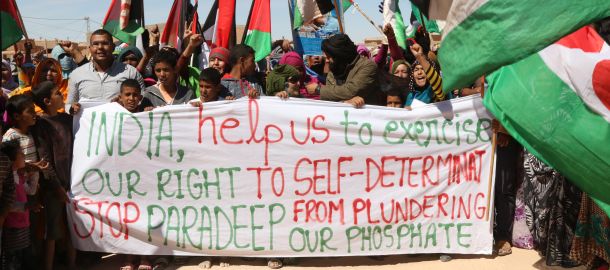
"The next mouthful of food you take after you read this may have an awful aftertaste. That's not necessarily because there\'s anything wrong with your food, but because of how it gets to your plate." Opinion in The Australian Financial Review, by Polisario's Australia representative, Mr. Kamal Fadel, 25 March 2008
Australia Financial Review
25 March 2008
In Australia, three companies control the superphosphate market. The largest is Incitec Pivot, which has about 65 per cent of the market. CSBP, owned by Wesfarmers, and Impact control the remainder.
According to a statement in 2007 from Incitec Pivot, "Without rock from Western Sahara, it is unlikely that Australian manufacturers could produce the 1 million tonnes of single superphosphate farmers require each year."
The trouble is. Western Sahara gets none of the benefit of this trade. Since 1975 the region, home to a distinct indigenous population known as Sahrawis, has become an illegal annex of Morocco. The kingdom has ensured the Sahrawis remain under its control, deprived of their basic liberties and freedoms. Some 165,000 Sahrawi refugees are stranded in the desert. Many haven't been able to go home for more than three decades.
UN resolutions come and go, confirming the right of Sahrawis to self-determination, and countless official admonitions emerge and fade away like mirages. Over 80 countries recognise Western Sahara as an independent entity and it is a member of the African Union No country recognises Morocco's occupation.
The spotlight was cast on Western Sahara again last week, but another round of talks between Sahrawis and Morocco ended in stalemate.
Despite widespread condemnation of Morocco's occupation and brief news-cycle flurries, the world has learnt how to ignore Western Sahara
But not the superphosphate industry. It has been pumping funds into the pockets of the Moroccan royal family and depriving impoverished Sahrawis of their rightful return on resources.
Various international legal pillars refer directly to Western Sahara's status as a non-self-governing territory. Legal opinion is mounting that Morocco's exploitation of Sahrawi resources, and the subsequent import of those resources, would fail the test of international jurisprudence.
The Australian government has offered only a limp response to the immoral phosphate import trade.
But businesses and investors overseas have been less forgiving. Swedish and Norwegian companies have already left the sector, dumping shares in Wesfarmers late last year.
Also, in 2006, various oil and gas companies signed contracts with the secessionist Western Sahara government in relation to various exploration and extraction rights. The crux of these agreements is that, when Sahrawis are given a vote on their independence, these companies will gain exclusive commercial rights.
It's a case of betting not on the winning horse, but on the right horse. The Australian superphosphate industry might take a leaf from this book and the federal government should be looking into ensuring a similarly more sustainable approach
All Australians — shareholders, voters and consumers — have a duty in ensuring that the unappetising story of Western Sahara's illegal exploitation is ended.
Kamal Fadel is the Australian representative for Polisario, the independence movement for Western Sahara.
See the opinion here.
New report: Western Sahara phosphate trade halved
The export of phosphate rock from occupied Western Sahara has never been lower than in 2019. This is revealed in the new WSRW report P for Plunder, published today.
New report on Western Sahara phosphate industry out now
Morocco shipped 1.93 million tonnes of phosphate out of occupied Western Sahara in 2018, worth an estimated $164 million, new report shows. Here is all you need to know about the volume, values, vessels and clients.
New report on contentious Western Sahara phosphate trade
Morocco shipped over 1.5 million tonnes of phosphate out of occupied Western Sahara in 2017, to the tune of over $142 million. But the number of international importers of the contentious conflict mineral is waning, WSRW's annual report shows.
New report on global phosphate trade from occupied Western Sahara
Over 200 million dollars worth of phosphate rock was shipped out of occupied Western Sahara last year, a new report from WSRW shows. For the first time, India is among the top importers.



